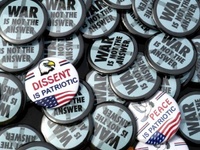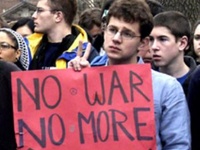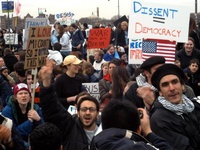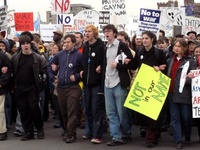This evasion of political issues perplexed many faculty members and others. Getlin, who decided not to join the Marine Corps after realizing that he no longer supported U.S. foreign policy, argued that the effort to divorce political beliefs from protests was flawed.
“The attitude that it is okay to support the troops and be against the war is rather absurd,” he says.
Teaching assistant McCarthy says he was disturbed by a culture of political apathy among students.
“It seems to me incredibly strange that the campus Democrats and campus Republicans would shy away from making a political stance on the most important political issues of our times,” McCarthy says. “That is what they are there for.”
A Separate Peace
While students were dismissing political labels, professors were organizing both against the war and for themselves.
“Some of us felt that there were faculty issues that were distinct,” he said. “Faculty can be fairly independent and isolated entities….We were looking for a larger voice.”
Others such as Mendelsohn joined to fulfill the responsibility they say they felt as campus leaders and leading scholars. But as they organized among themselves, the Faculty soon fastened on the USA Patriot Act as a greater threat than any war.
At Faculty meetings, professors said they were worried about the restrictions the law could put on their own scholarship.
In the 1960s, students had attacked administrators. But this time, professors spoke out to demand that the University take action and protect academic freedom from new security restrictions.
“A university ought to outright defend these issues,” said Mendelsohn. “But Harvard hesitated.”
Mendelsohn, who proposed that the Faculty adopt its own a statement on academic freedom, said that he was asked to wait for University President Lawrence H. Summers to issue a statement.
“They did not take on a leadership role as they had on other occasions,” Mendelsohn said. “I would have loved to see them take a stronger lead.”
Frustrated with what they perceived as Harvard’s tacit compliance with an “unjust war,” professors soon began a new movement against Harvard’s holdings in defense contractors profiting from the war.
At an April 8 Faculty meeting, FIPJ member and Pulitzer Professor of Modern Art Yve Alain-Bois read a statement endorsed by dozens of professors saying that Harvard’s investment defense contractors was amoral and in need of discussion.
Read more in News
Pataki: 'Yale is Going to Crush Harvard'

















